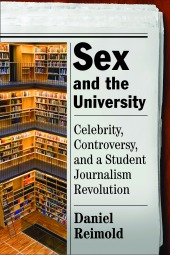Jackie Hai is a hybrid- a student journalist extraordinaire with competing interests in (ready for this?) philosophy, anthropology, economics, music, physical discipline, and information technology. Growing up in greater Boston, the UMASS Amherst senior considered careers in archaeology, online game development, film, and music. The news media prevailed, and are the better for it.
—
Spread the word: Hai, 21, is a journalistic and new media wunderkind who should be on anyone’s short list for collegemediatopia’s j-student of the year. She is program director and Webmaster for the UMASS campus television station. And she co-founded and currently operates The Amherst Wire, an independent online student news outlet whose aim is localization and innovation and whose potential is limitless.
—
The site’s tagline: Local. New. Media. This post has a tagline of its own: Student. Journalist. Spotlight. The star of the show this time around, joining a growing coterie of standout collegiate journos from schools such as Harvard, Nebraska, Indiana, and NYU: Jackie Hai.
—

Jackie Hai, at a UVC-TV video editing station.
—
Write a six-word memoir of your Amherst Wire experience so far.
Try something new at every opportunity.
—
—
To all the campus media haters out there: Why does Amherst Wire matter?
The Amherst Wire is an in-your-face rebuttal to the stereotype of college students living in a bubble, oblivious to what’s happening in the real world.
—
—
What is one feature on the site you’re especially proud to have helped put together?
Market Meltdown 101 and Economic Stimulus 101 are our flagship features right now and what put us on the map. Definitely worth all the sleepless nights. (Ed. note: The features were linked by The Boston Globe and received special mention in a recent MediaShift post.)
—
—
Memorable behind-the-scenes production moment.
The clock was ticking down to deadline for publishing Economic Stimulus 101, and another editor and I were piecing together the whole package down at the UVC-TV station (our sister campus media outlet) late at night. When it hit us that we had way too much information to organize, we broke out the paper, pens and scissors and arranged almost a hundred little strips of paper on the table to plan our layout. The irony of resorting to the most basic of technologies in the production of a “new media” Web feature was not lost on us.
—
—
What first sparked your passion for journalism?
I can’t pinpoint a specific moment, but the personal connections I’ve made with people in journalism and the communities we’ve touche over the last four years were a major catalyst, and what inspired me to turn this into a lifelong pursuit.
—
—
What is the coolest part about running a standout online journalism outlet?
Having a low, low overhead and running on a flexible, open-source platform frees us to pursue pretty much any journalistic project that tickles our fancy and innovate the heck out of it.
—
—
What is one question we should all be asking much more often about the current state or future of journalism?
It’s not who or what is going to pay for journalism, but what are the best practices of journalism- the kind that serves society and improves the world- that are worth sustaining?
—
—
You wake up in ten years. Where are you and what are you doing?
In another city somewhere, getting ready to visit a citizen media group later that day to teach a workshop on multimedia journalism as part of their new partnership with a local news organization.
Read Full Post »











